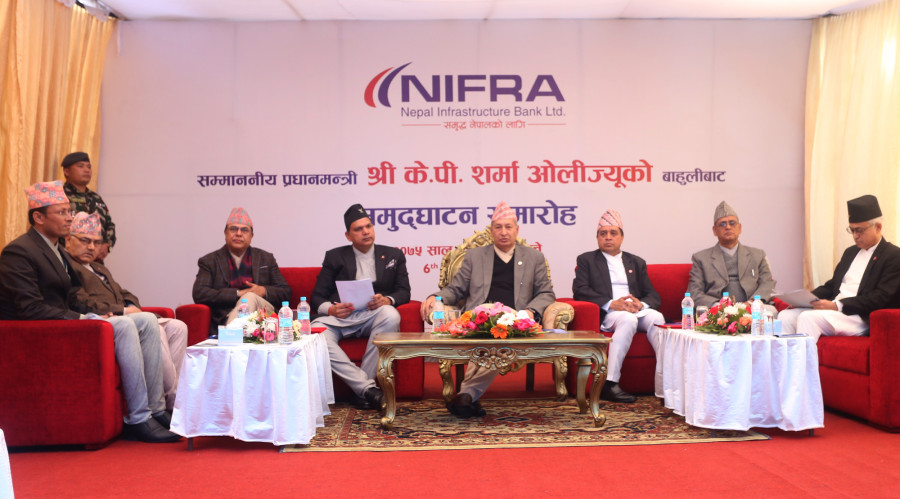Money
Nepal Infrastructure Bank opens
Nepal Infrastructure Bank, the first private sector-led financial institution in the country established with the objective of funding large infrastructure projects, threw open its doors on Wednesday.
Bibek Subedi
Nepal Infrastructure Bank, the first private sector-led financial institution in the country established with the objective of funding large infrastructure projects, threw open its doors on Wednesday.
The country’s leading business groups and the government have invested in the bank under a public-private partnership model. The bank has an authorised capital of Rs40 billion, issued capital of Rs20 billion and paid-up capital of Rs12 billion.
The government has a 10 percent stake in the bank and the rest of the shares are owned by public limited companies, private investors and the general public. Public companies and the general public hold 40 percent of the stock each and private investors hold the remaining 10 percent.
Finance Minister Yuba Raj Khatiwada officially inaugurated the bank amid a programme in Kathmandu on Wednesday. According to officials of the newly established bank, it will play an active role in managing funds required for large infrastructure projects from both domestic and foreign sources and also invest in credit instruments issued by such schemes.
“In the coming days, the bank will work as a nodal bank for Nepal’s infrastructure development,” said Anuj Agrawal, chairman of the bank.
Outlining the bank’s future plans, CEO Anil Gyawali said that it would move ahead with a special strategy to invest in infrastructure sectors such as energy, transportation and tourism. “As the country has adopted a federal system, we will open branches in all seven provinces and invest in infrastructure projects there,” said Gyawali.
Nepal Rastra Bank, the central bank and regulator of banks and financial institutions in the country, issued an operating license to Nepal Infrastructure Bank on February 11 with the aim of filling the infrastructure funding gap in the country. The central bank created a separate directive for Nepal Infrastructure Bank which is more lenient than that governing other banks and financial institutions in the country.
Nepal Infrastructure Bank will be allowed to extend loans up to 90 percent of its credit to core capital and deposits ratio while the ceiling for commercial banks is 80 percent. As per the directive, the minimum deposit accepted under fixed deposits is Rs10 million, and the minimum maturity period is five years.
As an A class financial institution, the bank needs to maintain a capital adequacy ratio of 11 percent.
The central bank has fixed the interest rate spread of the bank, which is the difference in borrowing and lending rates, at 4 percent.
Nepal is in dire need of capital for infrastructure to reach the targets set by the Sustainable Development Goals by 2030. As per National Planning Commission estimates, the country requires Rs1,770 billion in investments annually to meet the targets.




 17.12°C Kathmandu
17.12°C Kathmandu














